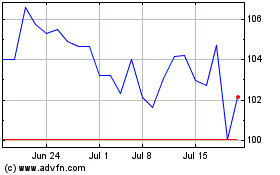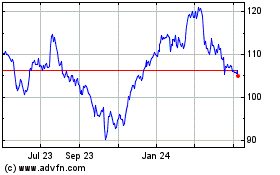A $25 billion deal for medical-products maker comes amid rush of
M&A activity
By Joseph Walker And George Stahl
Abbott Laboratories' deal to acquire medical-products maker St.
Jude Medical Inc. for $25 billion was the largest in a flurry of
health-care deal-making Thursday that could total more than $40
billion.
France's Sanofi SA said Thursday it made an unsolicited, $9.3
billion offer to purchase San Francisco-based Medivation Inc.,
which sells a lucrative prostate-cancer drug. AbbVie Inc. of North
Chicago, Ill., agreed to pay $5.8 billion, plus up to an additional
$4 billion in potential future payments, to acquire privately held
cancer-treatment developer Stemcentrx Inc. of South San Francisco,
continuing AbbVie's aggressive push to build an oncology
business.
The deals show health care remains an engine of M&A activity
despite a crackdown on tax-lowering maneuvers known as inversions
that drove a number of large deals in recent years.
Fueled by industry fundamentals more than tax-lowering
strategies, health-care companies have announced $121.12 billion in
global deal activity this year, second only to the technology
industry's $145.78 billion in deals so far this year, according to
Dealogic.
Health-care consolidation has itself sparked new deals as health
insurers, hospitals and medical-device suppliers respond to cost
pressures by gaining heft and scale to increase their negotiating
leverage with each other and gain pricing power.
In the pharmaceuticals industry, companies are looking to
invigorate their aging product pipelines and fuel growth. AbbVie
and Sanofi, for example, are each grappling with how to offset
expected revenue declines as some of their biggest products lose
patent protection and face competition for the first time. The
latest deals place a big bet that cancer medicines will continue to
command premium prices and generate big sales.
For Abbott, its acquisition is a way to bulk up its
medical-devices business to better compete against rivals Medtronic
PLC and Boston Scientific Corp. Abbott said it was also aiming to
gain a better negotiating position with its hospital customers,
which themselves have become larger and more powerful in recent
years.
Insurance companies are aiming to hold down health-care costs by
paying less for services from doctors and hospitals, who then look
to reduce supply-chain expenses by using fewer vendors in exchange
for greater discounts. That's pushing device makers like Abbott to
offset pricing pressure from their customers with deals that let
them offer greater volume and more products.
"The hospital chains have gotten larger, and more sophisticated
about what they're purchasing and what they're willing to pay,"
said Raj Denhoy, a Jefferies & Co. analyst, in an interview.
"Device companies have been on the receiving end of that, but if
you're larger you have more power to negotiate."
Abbott's deal to acquire St. Jude Medical is the largest
health-care merger so far this year. The offer values each St. Jude
share at about $85, representing a 37% premium to the stock's
closing price Wednesday.
Abbott has an eclectic mix of businesses that include
nutritional drinks like Ensure, glucose monitors for diabetes
patients, and selling branded generic pharmaceuticals in
international markets.
Abbott's medical-devices business has been seen by some analysts
as a drag on the company's otherwise encouraging growth, especially
in emerging markets like China and Latin America. Excluding the
impact of foreign currency fluctuations, Abbott's medical-device
sales rose 0.5% to $1.2 billion in the first quarter of this year,
lower than the company's overall revenue growth of 5.1%.
St. Jude's sales fell 1.4% to $5.54 billion in 2015, and its
earnings declined 12% to $880 million. The majority of the St.
Paul, Minn., company's revenue comes from heart devices including
pacemakers and implanted defibrillators. Those products complement
Abbott's line of stent devices, small tubes that prop open diseased
arteries, and could help the company cross-sell to hospitals,
analysts said.
When combined, the merged company will have annual
cardiovascular sales of $8.7 billion. The transaction still
requires shareholder and regulatory approvals. The companies expect
the deal to close in the fourth quarter.
Abbott CEO Miles White, speaking on a conference call with
analysts on Thursday, said acquiring St. Jude would give the
company a larger product portfolio and sales force to win business
in a more consolidated market.
"The value of having breadth in your product lines, the changing
way the health-care community has consolidated or purchases or
selects products, all those factors come to a point over time where
the strategic value of Abbott and St. Jude coming together becomes
compelling," Mr. White said.
Another large medical-device firm, Medtronic PLC, gave a similar
rationale when it agreed to acquire Covidien PLC in 2014, arguing
that hospitals would increasingly look to purchase medical supplies
from fewer and fewer vendors. Medtronic, which also inverted its
tax base to Ireland in the Covidien merger, is a major competitor
to St. Jude in the pacemaker and implanted defibrillator
markets.
Lehigh Valley Health Network, a hospital system based in
Allentown, Pa., buys most of its cardiology devices from two to
three companies, down from six to eight suppliers in prior years,
said Bill Matthews, the hospital system's chief procurement
officer, in an interview. Lehigh's purchasing power also has
improved as it has grown larger through acquisitions, he said.
"Bigger is better," Mr. Matthews said. Still, he worries that
the power balance may shift back to device-makers and other
suppliers as the industry consolidates. "I worry about it in terms
of how it's going to affect competition, and our ability to
continue to put pressure on pricing."
--Peter Loftus contributed to this article.
Write to Joseph Walker at joseph.walker@wsj.com and George Stahl
at george.stahl@wsj.com
(END) Dow Jones Newswires
April 29, 2016 02:48 ET (06:48 GMT)
Copyright (c) 2016 Dow Jones & Company, Inc.
Abbott Laboratories (NYSE:ABT)
Historical Stock Chart
From Mar 2024 to Apr 2024

Abbott Laboratories (NYSE:ABT)
Historical Stock Chart
From Apr 2023 to Apr 2024
